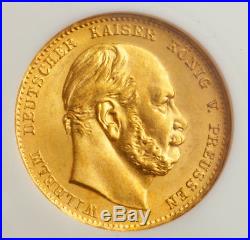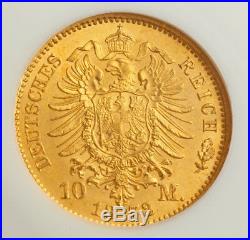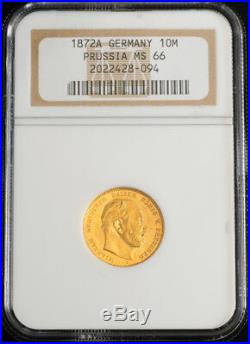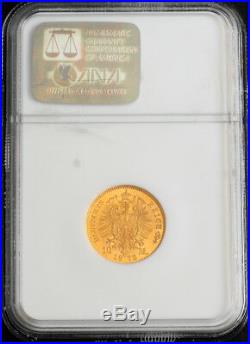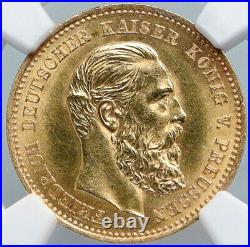
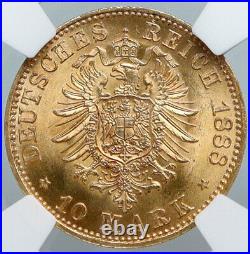
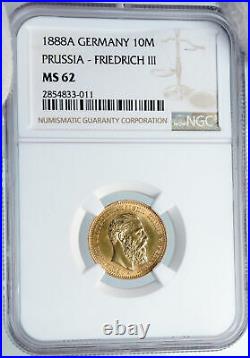
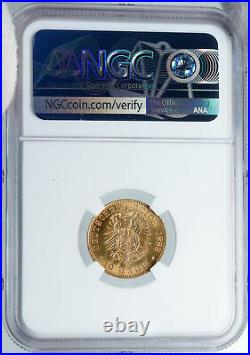
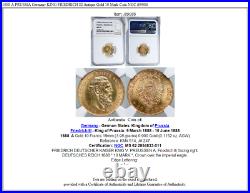

Item: i89086 Authentic Coin of. King of Prussia: 9 March 1888 – 15 June 1888 1888 A Gold 10 Francs 19mm (3.98 grams) 0.900 Gold 0.1152 oz. AGW Reference: KM# 514, J# 247 Certification: NGC. MS 62 2854833-011 FRIEDRICH DEUTSCHER KAISER KÖNIG V. PREUSSEN A, Friedrich III, facing right. DEUTSCHES REICH 1888 10 MARK , Crown over the imperial eagle. Frederick III German: Friedrich III. 18 October 1831 – 15 June 1888 was German Emperor and King of Prussia for ninety-nine days in 1888, the Year of the Three Emperors. Known informally as “Fritz”, was the only son of Emperor Wilhelm I and was raised in his family’s tradition of military service. Although celebrated as a young man for his leadership and successes during the Second Schleswig, Austro-Prussian and Franco-Prussian wars, he nevertheless professed a hatred of warfare and was praised by friends and enemies alike for his humane conduct. Following the unification of Germany in 1871 his father, then King of Prussia, became the German Emperor. Upon Wilhelm’s death at the age of ninety on 9 March 1888, the thrones passed to Frederick, who had by then been German Crown Prince for seventeen years and Crown Prince of Prussia for twenty-seven years. Frederick was suffering from cancer of the larynx when he died, aged fifty-six, following unsuccessful medical treatments for his condition. Frederick married Victoria, Princess Royal, eldest daughter of Queen Victoria of the United Kingdom. The couple were well-matched; their shared liberal ideology led them to seek greater representation for commoners in the government. Frederick, in spite of his conservative militaristic family background, had developed liberal tendencies as a result of his ties with Britain and his studies at the University of Bonn. As the Crown Prince, he often opposed the conservative Chancellor Otto von Bismarck, particularly in speaking out against Bismarck’s policy of uniting Germany through force, and in urging that the power of the Chancellorship be curbed. Liberals in both Germany and Britain hoped that as emperor, Frederick III would move to liberalize the German Empire. Frederick and Victoria were great admirers of Prince Albert, Queen Victoria’s husband. They planned to rule as consorts, like Albert and Queen Victoria, and to reform what they saw as flaws in the executive branch that Bismarck had created for himself. The office of Chancellor, responsible to the Emperor, would be replaced with a British-style cabinet, with ministers responsible to the Reichstag. Government policy would be based on the consensus of the cabinet. Frederick described the Imperial Constitution as ingeniously contrived chaos. The Crown Prince and Princess shared the outlook of the Progressive Party, and Bismarck was haunted by the fear that should the old Emperor die-and he was now in his seventies-they would call on one of the Progressive leaders to become Chancellor. He sought to guard against such a turn by keeping the Crown Prince from a position of any influence and by using foul means as well as fair to make him unpopular. However, his illness prevented him from effectively establishing policies and measures to achieve this, and such moves as he was able to make were later abandoned by his son and successor, Wilhelm II. The timing of Frederick’s death and the length of his reign are important topics among historians. The premature demise of Frederick III is considered a potential turning point in German history; and whether or not he would have made the Empire more liberal if he had lived longer is still discussed. Germany , officially the Federal Republic of Germany is a federal parliamentary republic in western-central Europe. It includes 16 constituent states and covers an area of 357,021 square kilometres (137,847 sq mi) with a largely temperate seasonal climate. Its capital and largest city is Berlin. With 81 million inhabitants, Germany is the most populous member state in the European Union. After the United States, it is the second most popular migration destination in the world. Various Germanic tribes have occupied northern Germany since classical antiquity. A region named Germania was documented before 100 CE. During the Migration Period the Germanic tribes expanded southward. Beginning in the 10th century, German territories formed a central part of the Holy Roman Empire. During the 16th century, northern German regions became the centre of the Protestant Reformation. The rise of Pan-Germanism inside the German Confederation resulted in the unification of most of the German states in 1871 into the Prussian-dominated German Empire. The establishment of the Third Reich in 1933 led to World War II and the Holocaust. After 1945, Germany split into two states, East Germany and West Germany. In 1990, the country was reunified. In the 21st century, Germany is a great power and has the world’s fourth-largest economy by nominal GDP, as well as the fifth-largest by PPP. As a global leader in several industrial and technological sectors, it is both the world’s third-largest exporter and importer of goods. Germany is a developed country with a very high standard of living sustained by a skilled and productive society. It upholds a social security and universal health care system, environmental protection and a tuition free university education. Germany was a founding member of the European Union in 1993. It is part of the Schengen Area, and became a co-founder of the Eurozone in 1999. Germany is a member of the United Nations, NATO, the G8, the G20, and the OECD. The national military expenditure is the 9th highest in the world. Known for its rich cultural history, Germany has been continuously the home of influential artists, philosophers, musicians, sportsmen, entrepreneurs, scientists and inventors. World-renowned expert numismatist, enthusiast, author and dealer in authentic ancient Greek, ancient Roman, ancient Byzantine, world coins & more. Ilya Zlobin is an independent individual who has a passion for coin collecting, research and understanding the importance of the historical context and significance all coins and objects represent. Send me a message about this and I can update your invoice should you want this method. Getting your order to you, quickly and securely is a top priority and is taken seriously here. Great care is taken in packaging and mailing every item securely and quickly. What is a certificate of authenticity and what guarantees do you give that the item is authentic? You will be very happy with what you get with the COA; a professional presentation of the coin, with all of the relevant information and a picture of the coin you saw in the listing. Additionally, the coin is inside it’s own protective coin flip (holder), with a 2×2 inch description of the coin matching the individual number on the COA. Whether your goal is to collect or give the item as a gift, coins presented like this could be more prized and valued higher than items that were not given such care and attention to. When should I leave feedback? Please don’t leave any negative feedbacks, as it happens sometimes that people rush to leave feedback before letting sufficient time for their order to arrive. The matter of fact is that any issues can be resolved, as reputation is most important to me. My goal is to provide superior products and quality of service. How and where do I learn more about collecting ancient coins? Visit the Guide on How to Use My Store. For on an overview about using my store, with additional information and links to all other parts of my store which may include educational information on topics you are looking for. The item “1888 A PRUSSIA Germany KING FRIEDRICH III Antique Gold 10 Mark Coin NGC i89086″ is in sale since Sunday, February 28, 2021. This item is in the category “Coins & Paper Money\Coins\ World\Europe\Germany\Empire (1871-1918)”. The seller is “highrating_lowprice” and is located in Rego Park, New York. This item can be shipped worldwide.
- Country/Region of Manufacture: Germany
- Certification Number: 2854833-011
- Certification: NGC
- Grade: MS 62
- Year: 1888
- Composition: Gold
- Denomination: Mark

Incoming search terms:
- 1888 A GOLD GERMAN STATES PRUSSIA 10 MARK FRIEDRICH III COIN NGC MINT STATE 62

